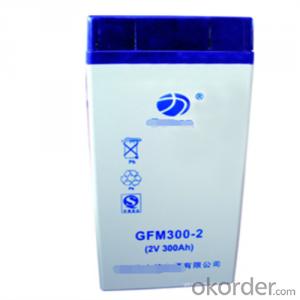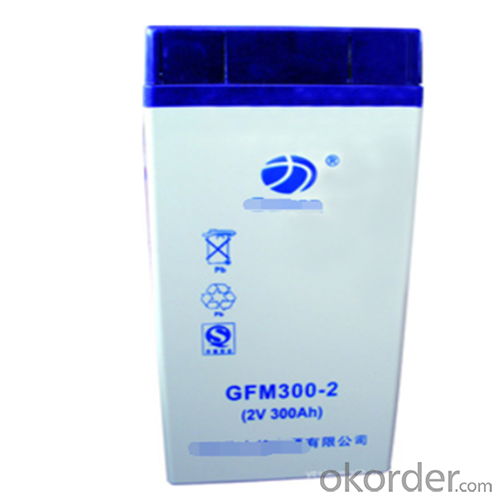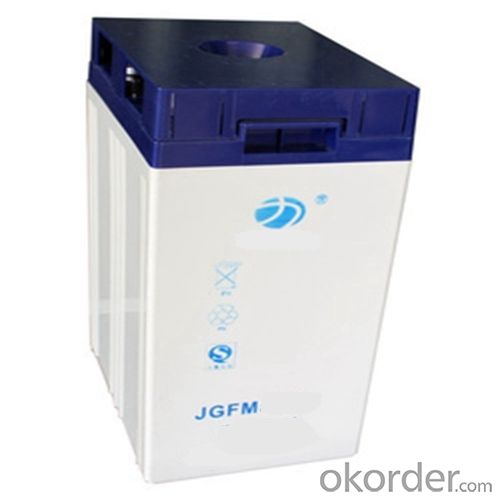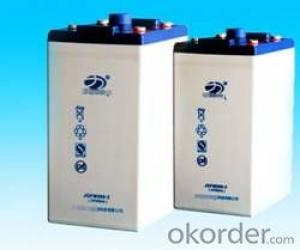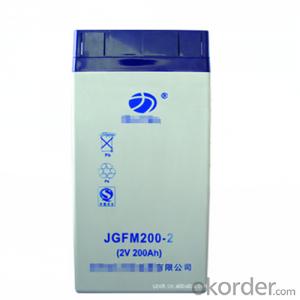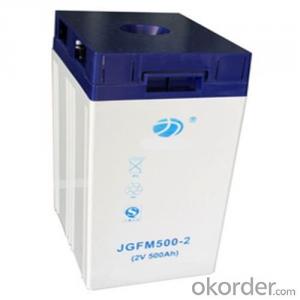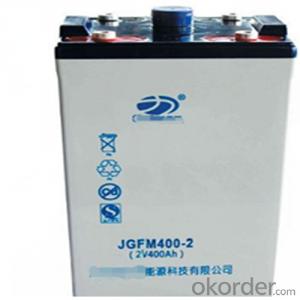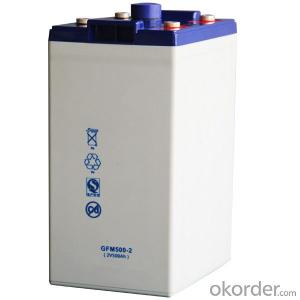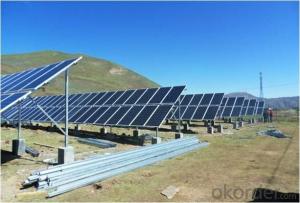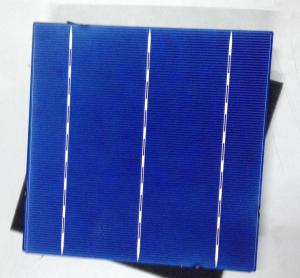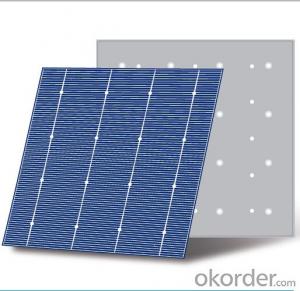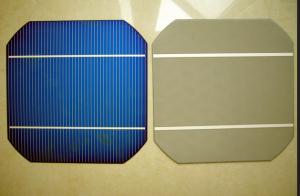Microlink Solar Cells Colloid Storage Battery JGFM Series 2V 300AH
- Loading Port:
- China main port
- Payment Terms:
- TT OR LC
- Min Order Qty:
- 1 pc
- Supply Capability:
- 3000000 pc/month
OKorder Service Pledge
OKorder Financial Service
You Might Also Like
Structure of Product Descrtiption
What is the product?
· Precision explosion relief valve shall be adopted
· Advanced wrapping technology and assembly technology
· Designed life is fifteen years,excellent performance of battery in low temperature and superiority in consistence and stability
· Can be used at vertical or horizontal orientation
· Balanced design for both floating and cyclic operation
· Low self-discharge rate and long shelf life
· Connecting terminal adopts stainless steel bolt,thus it has the characteristics of high strength and non-deforming
· Design with patented corrosion resisting alloy and thickened plate
What is the purpose of the product?
· Data Centre (High Rate UPS)
· Telecommunication
· Banks & Financial Centre
· Hospital& Testing Laboratories
· Power Generation Plants
· High Power Backup Supply
· Design with patented corrosion resisting alloy and thickened plate
What advantages do products have ?
· Stable quality&high reliability
· Sealed construction
· Environmentally friendly
· Maintenance-free operation
· Low pressure venting system
· Heavy duty grid
· Low self discharge
Main feature of the product:
*safety and reliable
*environmental friendly and fast delivery
*low self diacharge
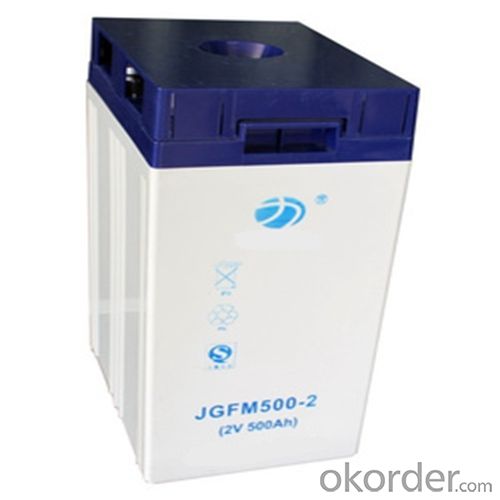
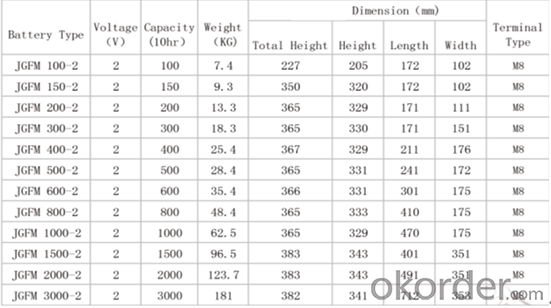
FAQ:
1. What’s price per watt?
A: It’s depends on the quantity, delivery date and payment terms of the order. We can talk further about the detail price issue. Our products is high quality with lower price level.
2. Can you tell me the parameter of your solar panels?
We have different series of cells with different power output, both from c-si to a-si. Please take our specification sheet for your reference.
3. How do you pack your products?
We have rich experience on how to pack the panels to make sure the safety on shipment when it arrives at the destination.
- Q: What is the role of solar cells in powering remote monitoring systems?
- Solar cells play a crucial role in powering remote monitoring systems by converting sunlight into electricity. These systems are often installed in remote locations where access to traditional power sources is limited or non-existent. Solar cells provide a sustainable and reliable source of energy to continuously power these systems, allowing for continuous monitoring and data collection even in remote areas.
- Q: Can solar cells be used in mobile devices?
- Yes, solar cells can be used in mobile devices. In fact, there are already several mobile devices available in the market that are equipped with solar panels to harness solar energy and charge their batteries. These solar-powered mobile devices are particularly useful in situations where access to electricity is limited or unavailable.
- Q: Can solar cells be used for indoor applications?
- Yes, solar cells can be used for indoor applications. While solar cells are primarily designed to harness sunlight and convert it into electricity, they can also generate power from indoor lighting sources such as fluorescent or LED lights. However, the amount of electricity generated indoors is generally lower compared to outdoor conditions due to the reduced intensity of indoor lighting. Nonetheless, solar cells can still be used effectively for powering small devices or charging batteries in indoor settings.
- Q: Briefly explain why solar cells are made into components
- The main photovoltaic material is the crystalline silicon material (including polysilicon and monocrystalline silicon), this material is high hardness, brittleness, uneven force easily brittle, exposed to the air easily oxidized, and the use of the process can not
- Q: Can solar cells be used to power surveillance cameras?
- Yes, solar cells can be used to power surveillance cameras. Solar power provides a reliable and sustainable energy source for surveillance systems, making them independent of the electrical grid. This allows cameras to be placed in remote locations or areas without access to electricity, while still maintaining continuous operation.
- Q: What is the payback period for solar cells?
- The payback period for solar cells refers to the time it takes for the cost of installing solar panels to be recouped through energy savings. It typically ranges from 5 to 15 years, depending on factors such as the initial cost of installation, electricity usage, and available incentives or tax credits.
- Q: Can solar cells be used in vehicles?
- Yes, solar cells can be used in vehicles. Solar cells can be integrated into vehicles to generate electricity from the sun's energy, which can be used to power various components of the vehicle such as the battery, air conditioning, or even the entire propulsion system. This helps reduce reliance on fossil fuels and decreases greenhouse gas emissions, making solar-powered vehicles an environmentally friendly alternative.
- Q: Is A grade better than the B grade when we buy the poly solar cells.
- The poly solar cell with A grade means the sustainabilty and quality of the poly solar cells are better than the others.
- Q: How do solar cells perform in high-altitude locations?
- Solar cells perform well in high-altitude locations due to several factors. Firstly, at higher altitudes, there is often less air pollution and cloud cover, leading to more sunlight reaching the solar cells. Additionally, the thinner atmosphere at high altitudes allows for a higher concentration of solar radiation, resulting in increased energy generation. Finally, the cooler temperatures at higher altitudes can actually improve the efficiency of solar cells, as they tend to perform better in lower temperatures. Overall, solar cells are highly effective in high-altitude locations, making them an ideal renewable energy solution in such areas.
- Q: How do solar cells perform in high humidity environments?
- Solar cells can still perform efficiently in high humidity environments. However, prolonged exposure to high humidity can slightly decrease their overall efficiency due to the moisture affecting the cell's performance and the build-up of dirt and dust particles. Regular cleaning and maintenance can help mitigate these effects and ensure optimal performance.
Send your message to us
Microlink Solar Cells Colloid Storage Battery JGFM Series 2V 300AH
- Loading Port:
- China main port
- Payment Terms:
- TT OR LC
- Min Order Qty:
- 1 pc
- Supply Capability:
- 3000000 pc/month
OKorder Service Pledge
OKorder Financial Service
Similar products
Hot products
Hot Searches
Related keywords
